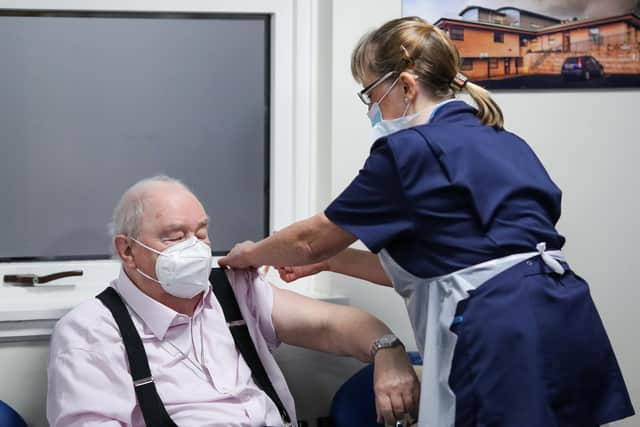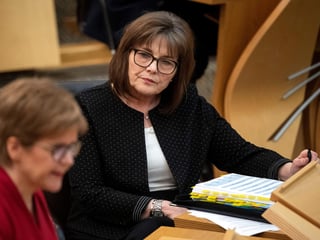Covid-19 vaccine in Scotland: 400,000 doses not yet used amid calls to speed up 'sluggish' rollout
It comes as new figures show 163,377 people in Scotland have been given a first dose of the vaccine, and First Minister Nicola Sturgeon said Scotland is in the “most perilous and serious position” since the start of the pandemic.
Ms Sturgeon announced that as of Monday 1,664 people were in hospital with Covid-19, while 1,782 new cases had been reported.
Advertisement
Hide AdAdvertisement
Hide AdThe spike in Covid-19 figures since Christmas, which some have already labelled a third wave, have surpassed March/April peaks in almost all metrics, with hospitals at capacity and NHS staff warning they are at breaking point.


NHS Lanarkshire exceeded its capacity for Covid-19 beds on Monday, labelled an “extremely worrying development” by Labour health spokesperson Monica Lennon.
Ms Sturgeon said recent increases in cases are putting the NHS “under strain”.
She added that the vaccination programme is the “main route out right now of the situation we all find ourselves in”.
Monday marked the first official day of community vaccination of the over 80s in Scotland, with 1,100 vaccination sites now in operation around the country – mostly GP practices.
Some 50,000 doses of Covid-19 vaccine were administered in the fifth week of the programme ending on January 10, an increase on the previous week.
The Scottish Government denied a drop in vaccinations from 35,500 in the week to December 27 to 21,500 in the week to January 3 was caused by the cancellation of thousands of appointments to receive a second dose of the Pfizer vaccine, following a scheduling change from the Joint Committee on Vaccination and Immunisation (JCVI).
In her first outline of Scotland’s vaccination plan at the end of November, Ms Freeman said one million Scots would be vaccinated by the end of January or very beginning of February.
Advertisement
Hide AdAdvertisement
Hide AdOn Monday she announced this target has been dropped to just under 560,000.
The rate of vaccination in Scotland will need to rapidly increase to achieve this, to an average of over 130,000 doses a week.
So far over 70 per cent of those in care homes have been given a first dose, Ms Freeman said.
All Scots over 18 were initially to be offered a vaccine by the end of Spring 2021, a date which has now been pushed back to Autumn.
Ms Freeman said in December that Scotland was “ready to deliver” on vaccination, but that the programme would be dependent on supplies.
The UK Government said on Monday that 560,000 vaccines have been delivered to Scotland to date, meaning just under 400,000 vaccines are available but have not yet been used.
Monday marked the first daily update on vaccination figures in Scotland, following calls for more transparency. Nicola Sturgeon has repeatedly rebuffed calls to publish regular data on vaccination supply.
When asked about reports of around 500,000 doses having been delivered to the country by Monday, Ms Sturgeon said in her daily coronavirus update: “That ballpark is broadly right, the precise numbers will change.
Advertisement
Hide AdAdvertisement
Hide Ad"Last week I said that by the end of January we will anticipating having just over 900,000 doses. We have a significant chunk of that already, and some of it is coming at the end of January.
"Until very recently we had anticipated having to effectively hold back half of our supply for second doses within three weeks.
"We don’t have to do that now so we have more supply in Scotland that is available to give people their first doses, so we will use that vaccine as quickly as possible.”
The Scottish Conservatives have called for a speeding up of the delivery.
"The rollout of the vaccine appears to be sluggish and clearly the pace needs to be increased,” said health spokesperson Donald Cameron.
“It may be early days but vaccines will need to reach people more than twice as fast to reach targets.”
As of January 10, Scotland’s vaccine rollout had fallen slightly behind that of England, with just under three per cent of the population in Scotland given a first dose, while 3.5 per cent had been given one in England.
The highest vaccination proportion so far is in Northern Ireland, which has passed four per cent of the population. Wales has so far given 2.7 per cent of the population a first dose.
Advertisement
Hide AdAdvertisement
Hide AdIn addition, some 375,000 people in England were given a second dose of the Pfizer vaccine before a decision was made to delay these, compared to 36 people in Scotland.
Health officials have previously said Scotland’s rollout may be more challenging due to a more rural population.
When asked last week why vaccine delivery in Scotland had been delayed since Ms Freeman’s initial statement in November, Ms Sturgeon said: “Nothing’s changed. If you go back to before Christmas when Jeane Freeman [made her initial vaccine statement] we didn’t know whether AstraZeneca was going to be approved in the timescale it has been, we had assumptions about supplies, both of Pfizer and AstraZeneca.
"Some of those assumptions have changed [...] that’s just the nature of what we’re doing.
"We’re trying to get the best information on supply that we can, then work out the timescales based on that.”
She added: “We’re dealing with a moving and movable situation here where we’re trying to give as much information in real time as possible, but being candid with people that it’s subject to change, and some of what changes is outwith our control.”
A message from the Editor:
Thank you for reading this article. We're more reliant on your support than ever as the shift in consumer habits brought about by coronavirus impacts our advertisers.
If you haven't already, please consider supporting our trusted, fact-checked journalism by taking out a digital subscription.
Comments
Want to join the conversation? Please or to comment on this article.
